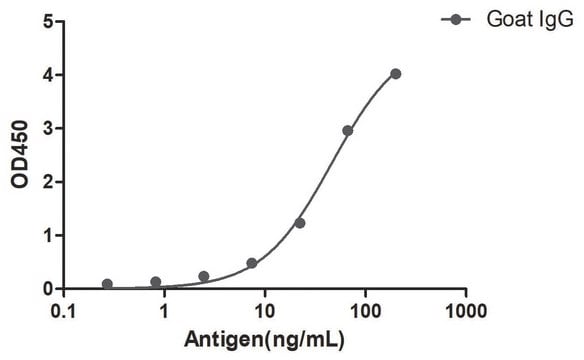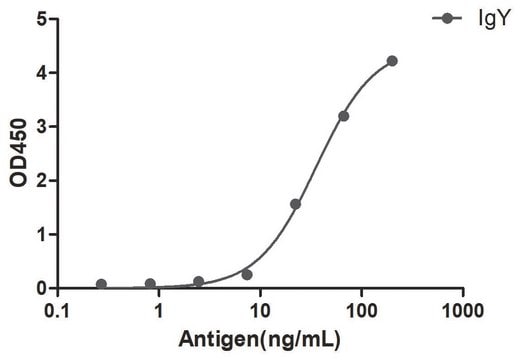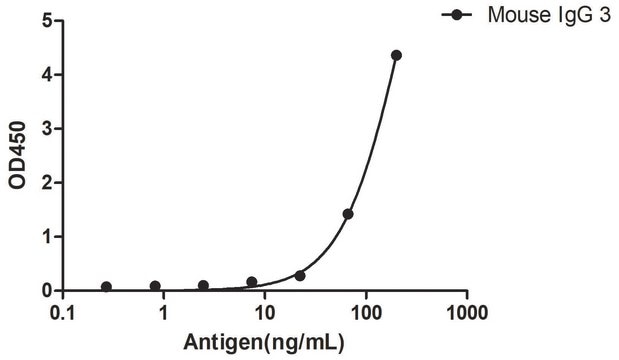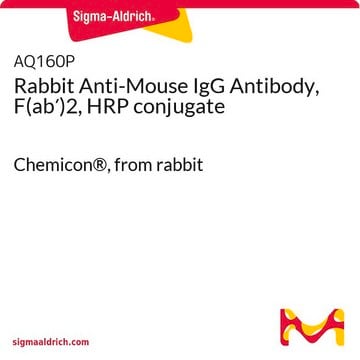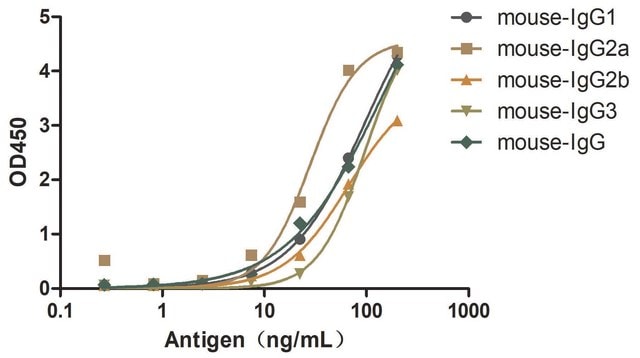SAB5801006
Alpaca Anti-Mouse IgG2a(Fcγ) single domain Antibody
recombinant Alpaca(VHH) Nano antibody
Synonym(s):
Recombinant Alpaca single variable domain secondary Nanobody
About This Item
Recommended Products
biological source
alpaca
recombinant
expressed in E. coli
conjugate
unconjugated (6*his tag and one cys were added at the C terminal of the VHH)
antibody form
affinity purified immunoglobulin
antibody product type
secondary antibodies
clone
recombinant monoclonal
form
lyophilized solid
mol wt
14 kDa
species reactivity
Alpaca, mouse
technique(s)
ELISA: 1:10000-1:50000
western blot: 1:10000-1:50000
size
0.1 mL
color
colorless
isotype
VHH
shipped in
wet ice
storage temp.
2-8°C
General description
Most monoclonal antibodies are generated in mouse. There are five antibody isotypes (IgA, IgD, IgE, IgG, and IgM) from mouse. Each isotype has a different heavy chain. Mouse IgG constitutes 75% of serum immunoglobulins, and IgG is the predominant form of first antibody produced from mouse. Mouse IgG consists of five subclasses-IgG1, IgG2a, IgG2b, IgG2c(inbred mouse strains with the Igh1-b allele have IgG2c isotype instead of IgG2a), IgG3. They are highly homologous and differ mainly in the hinge region. The whole IgG molecule possesses both the Fc region and the Fab region, which possessing the epitope-recognition site. The IgG contains two heavy and light chains, and the heavy chain is about 50 KD and the light chain is about 25 KD. The common IgG is monomeric with a molecular weight of approximately 150 kD.
VHH are single-domain antibodies derived from the variable regions of heavy chain of Camelidae immunoglobulin. The size of VHH is extremely small(<15KDa) compared to other forms of antibody fragment, which significantly increase the permeability of VHH. Thus VHH is considered of great value for research, diagnostics and therapeutics.
Specificity
Isotype: VHH domain of alpaca IgG2b/2c
Immunogen
Packaging
Physical form
Reconstitution
Storage and Stability
Other Notes
Not finding the right product?
Try our Product Selector Tool.
Signal Word
Warning
Hazard Statements
Precautionary Statements
Hazard Classifications
Aquatic Chronic 3 - Skin Sens. 1
Storage Class Code
13 - Non Combustible Solids
WGK
WGK 3
Flash Point(F)
Not applicable
Flash Point(C)
Not applicable
Regulatory Listings
Regulatory Listings are mainly provided for chemical products. Only limited information can be provided here for non-chemical products. No entry means none of the components are listed. It is the user’s obligation to ensure the safe and legal use of the product.
JAN Code
SAB5801006-100UG:
Certificates of Analysis (COA)
Search for Certificates of Analysis (COA) by entering the products Lot/Batch Number. Lot and Batch Numbers can be found on a product’s label following the words ‘Lot’ or ‘Batch’.
Already Own This Product?
Find documentation for the products that you have recently purchased in the Document Library.
Our team of scientists has experience in all areas of research including Life Science, Material Science, Chemical Synthesis, Chromatography, Analytical and many others.
Contact Technical Service


